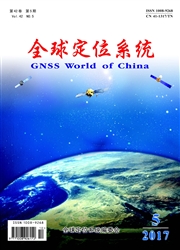

 中文摘要:
中文摘要:
Signals from the Global Navigation Satellite System (GNSS) scatter over the sea surface resulting in relatively low Signal-to-Noise Ratios (SNR). A differential coherent algorithm is given here to improve the SNR and reduce the performance degradation due to the Squaring-Loss and the navigation-bit effect. The algorithm uses fast navigation-bit correction for Delay-Doppler Maps (DDM) in airborne Global Navigation Satellite Signal Reflectometry (GNSS-R) software receivers. The system model is introduced with an analysis of the statistical properties with simulations to support the theoretical analysis. Field experiments with real airborne receivers then demonstrate the effectiveness of this algorithm. Comparisons with test results show that this algorithm offers a significant SNR gain over conventional algorithms.
 英文摘要:
英文摘要:
Signals from the Global Navigation Satellite System (GNSS) scatter over the sea surface resulting in relatively low Signal-to-Noise Ratios (SNR). A differential coherent algorithm is given here to improve the SNR and reduce the performance degradation due to the Squaring-Loss and the navigation-bit effect. The algorithm uses fast navigation-bit correction for Delay-Doppler Maps (DDM) in airborne Global Navigation Satellite Signal Reflectometry (GNSS-R) software receivers. The system model is introduced with an analysis of the statistical properties with simulations to support the theoretical analysis. Field experiments with real airborne receivers then demonstrate the effectiveness of this algorithm. Comparisons with test results show that this algorithm offers a significant SNR gain over conventional algorithms.
 同期刊论文项目
同期刊论文项目
 同项目期刊论文
同项目期刊论文
 A GPS Receiver Adaptive Digital Beamforming Interference Suppression Algorithm Based on Kalman Filte
A GPS Receiver Adaptive Digital Beamforming Interference Suppression Algorithm Based on Kalman Filte 期刊信息
期刊信息
